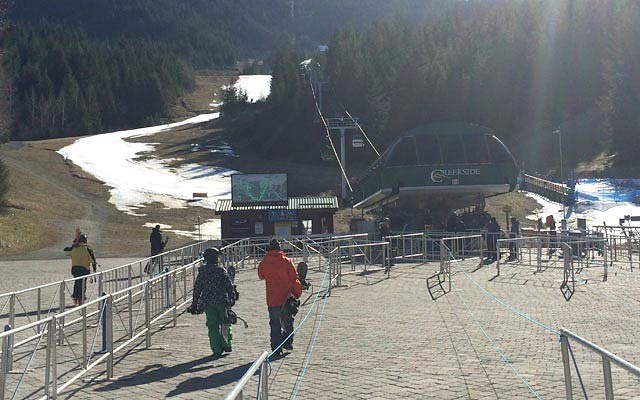The provincial government is taking action to prepare British Columbia's ski resorts for a warmer future by establishing a Climate Change Action Plan.
This week stakeholders met in Whistler as part of the on-going discussions on the plan.
With B.C. ski resorts providing a livelihood for 12,000 people, and bringing in $600 million in revenue annually — that's about eight per cent of total tourism revenue in B.C., according to Destination B.C. — the industry is too important to provincial coffers to fail to do long-term planning.
Whistler alone contributes $428 million in tax revenue per year to the Resort Municipality of Whistler, and the federal and provincial governments. It is responsible for an estimated 22.5 per cent of the entire annual tourism export revenue of B.C.
"The workshop was really intended to get feedback from our stakeholder group — the mountain resorts and community ski areas... so that we can help develop this climate action plan," said Bill Hunter, senior manager of major projects for the Mountain Resorts Branch of the all-day workshop, hosted by his branch of the provincial ministry of forests.
The discussion covered a wide range of topics, including discussing potential opportunities for collaboration, mitigation and adaptation. The next step for the plan is to incorporate some of the feedback that came from the meeting, Hunter said.
"We're hoping to have it finalized actually within a couple of weeks, and then it goes into a review process through the Competitiveness and Innovation Branch of the ministry," he said.
Though it's been a tough year for B.C.'s ski areas — many closed weeks early — the workshop approached the climate-change problem from a long-term perspective, said Arthur De Jong, mountain planning and environmental resource manager with Whistler Blackcomb (WB).
"This meeting was very much about the long term, how we are going to manage climate change in the long term as an industry," he said.
But this type of discussion is nothing new for those at the table, nor is action. WB's Peak 2 Peak Gondola, and the addition of new snowmaking equipment, are just part of the organization's plan to deal with a warmer climate in the valley.
"It's more formalizing what we know and putting it into a resort operation and development strategy," said De Jong.
Much of the discussion focused on the diversification of mountain resorts, so that they're better able to bear the brunt of a changing climate.
"What the government certainly connects with us on is 'how do we ensure that our land policy has the flexibility to ensure that we can successfully diversify?'" De Jong said.
WB has been working at diversification for years, De Jong said, citing the mountain bike park as an example, but there will be more work to do in the future.
"The BC Alpine policy, the land governance strategy that we are under, we need to ensure moving forward that we have the flexibility to successfully diversify, weatherproof our businesses more and build more resilience into our ski experience."
Having a firm Climate Change Action Plan in place will also help in ensuring that future resorts are prepared to succeed, said David Lynn, president and CEO of the Canada West Ski Areas Association.
"Applying to create a new resort is a multi-faceted process with a number of steps associated with it," he said.
"I think a lot of what we talked about in the workshop is just making sure that climate change is factored into those decisions, so that, to the extent that we do open new resorts, they're resorts that are designed to be viable from a climate change perspective 50 years from now as opposed to 50 years ago."
It's important to note that the challenges ski resorts are facing this year are more due to cyclical weather patterns than global warming, Lynn said.
"It was a hot topic in the media this year. I've done close to 20 interviews," he said.
"(But) we're trying to strike a balance of saying 'yes global warming is a real phenomenon, it's strongly supported by science, we need to adapt to it,' but at the same time, we don't want to attribute a single data point — i.e. this season — to global warming, per se, because we know there's an enormous role played by cyclical weather systems such as the El Nino system."
Ski resorts are a major economic driver for the province, but it's important to protect them for the health and wellness benefits they provide as well, Hunter said.
"These are public assets too, in some respects, that provide people an opportunity to get into the mountain environments and I think that breeds a stronger appreciation of environmental values, and that's very important," he said.
Getting all the stakeholders together to talk about how best to approach climate change is "huge," Hunter said.
"It really grounds our plan in fact," he said.
"I think that's the way it will be most successful, is if the industry group that we work with feeds into it and we create a very strong and realistic plan and we identify together those opportunities that we can work together, because the more resources and capacity we have to do this I think the greater success we'll have."




